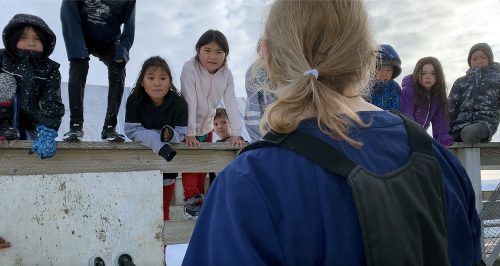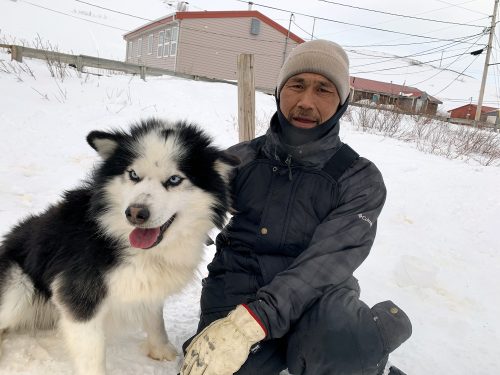One Health alumna provides veterinary care in Southwest Alaska
July 22, 2021
Tanya Clayton
907-474-7541

Laurie Meythaler-Mullins is one of the first two graduates of the University of Alaska Fairbanks’ new master's degree program in One Health, and she’s already putting her degree to good use.
Meythaler-Mullins, who received her UAF degree in May, works as a community outreach and public health veterinarian in Alaska’s Yukon-Kuskokwim Delta region. With 52 federally recognized tribes and 48 communities, the geographic area is roughly the size of the state of Louisiana. Until two years ago, this region had little access to veterinary care.
“The work is incredible,” Meythaler-Mullins said. “I had been in private practice for 11 years and loved it, yet I think my heart was calling to do something different, and this job really spoke to me.”
UAF’s One Health degree is an interdisciplinary fusion of science, culture, history and communication. It gives graduates the skills and tools to meet the unique needs of rural and Indigenous peoples.
“One Health is all about helping communities, particularly the small rural communities, to manage some of the big problems they’re facing,” said Dr. Arleigh Reynolds, director of the One Health program at UAF. “Our approach in the villages is to go in and listen, and say, ‘What are the most important issues for you?’ And then we gather information and build a plan that helps them manage those issues.”
Because One Health is collaborative, multiple viewpoints are used to identify and solve problems. Communities such as Akiak and Nightmute benefit from this in part because problem-solving is a mix of traditional and modern perspectives.
Lack of veterinary care has had a detrimental effect on the health of dogs in the communities. And because dogs play such an important role in village life, people are affected, both on a physical and an emotional level.
“The One Health concept has been around for thousands of years. But we have new challenges,” said Mike Williams Sr., a veteran dog musher and Akiak tribal president. “With climate change we have noticed an increase in the number of foxes. The dogs interact with them and we have to deal with rabies. And there are chemicals in our soil and water.”
The journey of a lifetime
Meythaler-Mullins got involved with the project two years ago, when she was approached by Reynolds and Dr. Danielle Frey, director of international student experiences for Colorado State University's doctoral program in veterinary medicine. A veterinary position had opened up as part of the new grant-funded Hub Outpost Project. A joint effort between UAF and CSU, the project aims to bring veterinary care and student training to the Yukon-Kuskokwim Delta. For Meythaler-Mullins, it was the chance of a lifetime.

Visits to the communities are tailored to local needs, as determined by community elders and the Yukon-Kuskokwim Health Corp. Issues include rabies, high rates of dog bites and lack of spay and neuter services.
Laura Anthony, a school teacher in Nightmute, recalled the start of her family’s ordeal with rabies. It began when she saw a dog in their house licking her baby on the face.
“And I had this sinking feeling, because he wasn’t a ‘lick-y’ sort of dog,” Anthony said. “And then Laurie called and said the fox that the dog had been with was rabid.”
In Alaska, rabies is mainly found in arctic and red foxes in the state’s northern and western coastal regions. People living in these regions most often come into contact with rabies from unvaccinated dogs that have been infected by foxes.
So began an experience the Anthony family doesn’t care to repeat.
“There were seven of us that had to get treated. We didn’t dare not treat someone and miss something,” Anthony said. “We were in Bethel for nine days. I still have nightmares about dogs infecting kids, and there are a lot of kids in the village.”
Helping make stronger communities
When Meythaler-Mullins was called upon to assist the community of Nightmute with its rabies concerns, she found that most of the dogs in the community were unvaccinated. So, along with tribal police officer Albert Olick, she embarked on a door-to-door rabies vaccination campaign. They also provided distemper and parvovirus vaccinations, along with anti-parasite treatments, to all of the households in Nightmute.

Improving the health of a community by improving the health of its dogs has given Meythaler-Mullins optimism. She is confident that the well-being of the communities will grow, now that people have more tools.
“The ideal picture is to start at the community level — you’re helping them, but definitely giving them the power to enable change on their own,” Meythaler-Mullins said.
Meythaler-Mullins is thrilled with the community connections she has learned how to make.
“Advocating for a community involves learning how to engage, and it's listening to the community and connecting,” she said. “The One Health connection, working with these communities … it's definitely been an incredible opportunity, and I’m so glad I took the jump.”


